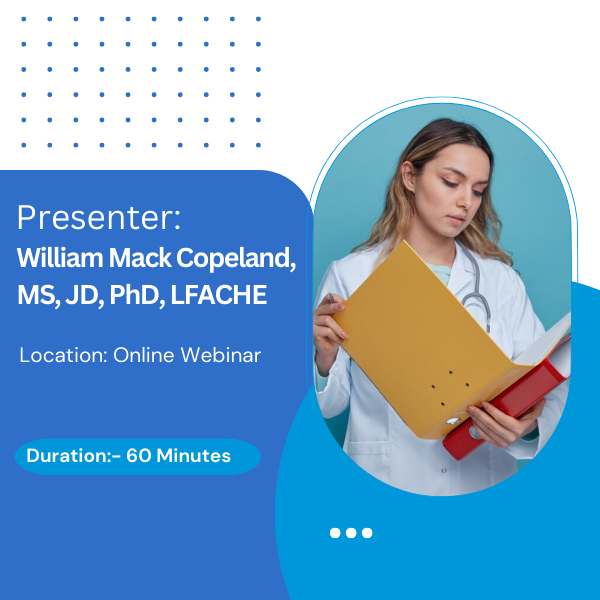Currently Empty: $0.00
Stark After Tuomey, Intermountain Health, Akron General, Prime Healthcare and Kalispell Regional
Price range: $251.00 through $255.00
Recent cases and/ or enforcement actions involving the Federal Physician Self-Referral Law (Stark II) raise serious concerns regarding compliance issues with hospitals, physician practices and other healthcare entities. However, Stark is greatly misunderstood by physicians, as well as healthcare executives.
This session is designed for healthcare executives, physicians and other healthcare providers who participate in and receive remuneration from Medicare, Medicaid, and other federal healthcare programs such as Tricare. Several recent cases bring home the realization that violations of Stark are common, and those violations can be used as the basis of a False Claims Act action.
As a health care executive, physician or other health care provider, attendees should be very concerned about the potential for violation of the Stark rules. In this webinar, attendees will learn about the elements of the Stark II law, along with the various exceptions that attendees can rely on for protection against enforcement under this law. This is important because under recently enacted healthcare laws, particularly The Affordable Care Act (also known as Obamacare), enforcement and healthcare fraud task forces have been greatly enhanced.
In Tuomey, the jury award was $279 million, and the case settled for $74 million, with the system being sold and the CEO personally paying $1 million and agreeing to be barred from federal healthcare programs for 5 years.
The law codifies the American Medical Association ethics rules concerning referrals. We will review these rules and the various exceptions to Stark so that attendees can be aware of what they can and cannot do regarding referrals.
Attendees will want to attend this webinar to learn how to protect themselves and their organization.
Learning Outcomes:
- Help attendees understand the complexities of Stark
- Show how a violation of Stark can result in a violation of the False Claims Act
- Provide an assessment of enforcement activities
- Review recent cases and show how they potentially impact attendees
- Show what is prohibited under Stark
- Review exceptions to Stark
- Discuss the criteria of exceptions
- Show how courts interpret the law
Areas Covered in the Session:
- Stark I
- The Ethics in Patient Referral Act of 1989
- Stark II
- Omnibus Budget and Reconciliation Act of 1993
- Only applies to Designated Health Services (DHS)
- Clinical Laboratory Services
- Physical Therapy, Occupational Therapy and Speech, Language, Pathology Services
- Radiology and Certain other Imaging Services
- Radiation Therapy Services and Supplies
- Durable Medical Equipment and Supplies
- Parenteral and Enteral Nutrients, Equipment, and Supplies
- Prosthetics, Orthotics and Prosthetic Devices and Supplies
- Home Health Services
- Outpatient Prescription Drugs
- Inpatient and Outpatient Hospital Services
- Intent
- Stark I: Prohibits Physicians from referring Patients to a Clinical Laboratory
- Stark II: Prohibits Physicians Referrals for the 11 Designated Health Services (DHS)
- Penalties
- Stark And The False Claims Act
- Voluntary Self-Disclosures New Policy
- Medicaid
- Exceptions
- Group Practice Exception
- In-Office Ancillary Services Exception
- Physician Services
- Personal Services
- Physician Recruitment
- Recent Cases
- Tuomey Healthcare System Case
- Intermountain Health Case
- Akron General Case
- Detroit Medical Center Case
- Prime Healthcare Case
- Kalispell Regional Medical Center Case
- Carlisle Hospital and Health Systems Case
- Learning from Recent Cases
- Recommendations
- Conclusion
Recommended participants:
- Nursing Homes
- Physician Practices
- Durable Medical Equipment Suppliers
- Physical Therapy Practices
- Home Healthcare Companies
- Healthcare CEOs
- Healthcare CFOs
- Chief Compliance Officers
- Chief Medical Officers
- Providers
- Practice Manager
- Attorneys and Legal Staff
- Medical Providers
- Physicians
- Registered Nurses
- Physicians Assistants
- Administrative Staff
- Sales and Marketing Managers
- Customer Service Managers
- Risk Managers
- Hospitals Human Resources
- Supervisors/ Managers
- Other Healthcare Provider Executives
Presenter Biography:
 William Mack Copeland, MS, JD, PhD, LFACHE, practices health care law in Harrison, Ohio at the firm of Copeland Law, LLC. He is also president of Executive & Managerial Development Group; a consulting entity providing compliance and other fraud and abuse-related services. A graduate of Northern Kentucky University SalmonP. Chase College of Law, Bill is a frequent author and speaker on health law topics. Copeland is a member of the American Health Lawyers Association, American, Ohio and Cincinnati Bar Associations and is a life fellow in the American College of Healthcare Executives. A former hospital chief executive officer, he was awarded the American College of Health Care Executives Senior-Level Healthcare Executive Regent’s Award in 2007.
William Mack Copeland, MS, JD, PhD, LFACHE, practices health care law in Harrison, Ohio at the firm of Copeland Law, LLC. He is also president of Executive & Managerial Development Group; a consulting entity providing compliance and other fraud and abuse-related services. A graduate of Northern Kentucky University SalmonP. Chase College of Law, Bill is a frequent author and speaker on health law topics. Copeland is a member of the American Health Lawyers Association, American, Ohio and Cincinnati Bar Associations and is a life fellow in the American College of Healthcare Executives. A former hospital chief executive officer, he was awarded the American College of Health Care Executives Senior-Level Healthcare Executive Regent’s Award in 2007.
Additional Information:
System Requirement:
- Internet Speed: Preferably above 1 MBPS
- Headset: Any decent headset and microphone which can be used to hear clearly
- For more information, you can reach out to the below contact: Toll-Free No: +1 800-757-9502 Email: cs@waymoreeducation.com





